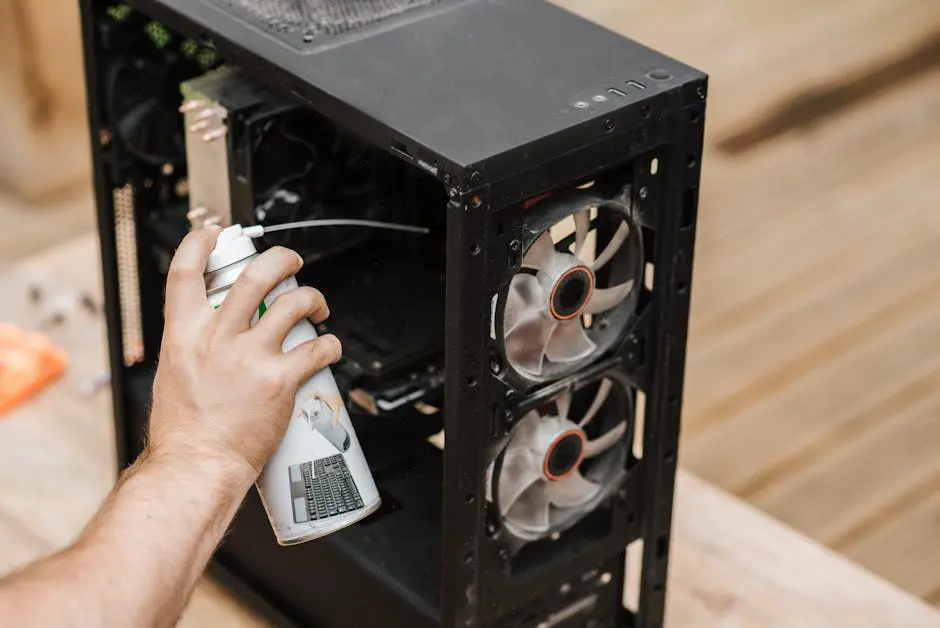In our digital-driven world, maintaining a clean and efficient PC is essential to ensure optimal performance. But how often should you clean your PC, and what does the process involve? This blog will navigate through the nuances of PC cleaning services and answer some of the most common questions users have.
What is a PC Cleaning Service?
A PC cleaning service involves professional maintenance that ensures your computer is free from dust, debris, malware, and any other factor that might hamper its performance. It’s a holistic approach to maintaining your computer’s health. These services typically encompass both physical cleaning—removing dust from the interior components—and software maintenance, like eliminating unnecessary files and potential malware. Trained technicians use advanced tools and techniques, often resulting in a more thorough cleaning than a typical do-it-yourself job.
Another aspect of PC cleaning services is their preventive nature. By catching potential issues during the cleaning process, these services can prolong the life of your machine and help avert substantial repair costs in the future. Many users are unaware that their computer’s sluggish performance can sometimes be attributed to simple issues like clogged cooling fans or outdated software. By addressing these promptly, a PC cleaning service not only revamps your computer’s speed and performance but also aids in data protection and security by ensuring your system remains malware-free.
Why is Regular Cleaning Important?
Just like any other machine, a computer accumulates dust over time. This dust can cause overheating and component failure if not addressed. Regular cleaning helps improve airflow, reduce heat, and prevent potential hardware problems. Dust and grime can obscure crucial sensors and fans, leading to inefficiencies and risk of hardware damage. For instance, obstructed fans cause processors and other components to run hotter, which can diminish their operational lifespan.
Moreover, an untidy digital space can replicate the problems of a physically dirty machine. Overcrowded hard drives and outdated programs slow down system operations, much like physical debris does hardware components. Ensuring both aspects are regularly cleaned provides the double advantage of preventing slow system response times and reducing the likelihood of a complete system failure. By staying on top of this routine maintenance, users ensure their PC performs optimally, much like a car that runs smoothly with regular oil changes and servicing.
DIY vs. Professional PC Cleaning: What to Choose?
While some users prefer handling their PC cleaning, professionals offer thorough and specialized service. DIY methods can be cost-effective but may lack the depth of a professional clean, which includes advanced tools and expertise. Consider your confidence and technical skill level when deciding on the best option. DIY cleaning might involve basic tasks like using a can of compressed air or cleaning software to enhance system performance, whereas a professional service might conduct more extensive checks, such as thermal paste replacement on the CPU.
Choosing between DIY and professional services also depends on your available resources and time. DIY solutions can be quick but often miss hidden dust deposits or sophisticated malware that affect performance significantly. On the other hand, professional services save time and guarantee comprehensive cleaning. Moreover, given their expertise, professionals can offer insights and recommendations tailored to your specific PC and usage habits, helping you maintain optimal performance going forward. Ultimately, whether you decide to undertake PC cleaning yourself or leave it to the professionals, the key is consistent and regular maintenance.
Common PC Cleaning Tools and Techniques
Understanding the tools and techniques is vital whether you opt for DIY or professional services. These include compressed air cans, microfiber cloths, and software tools to clean both the physical and digital aspects of your PC. For physical cleaning, compressed air is highly effective at dislodging dust from hard-to-reach places within the PC case. Microfiber cloths, on the other hand, are suitable for wiping down surfaces without scratching them. For digital cleaning, tools such as antivirus software and disk cleanup utilities help in clearing out unwanted files and ensuring the system runs smoothly.
In addition to these manual tools, it’s also beneficial to utilize technological solutions. For example, regular updates and patching can significantly reduce the risk of malware infections and enhance the overall security posture of your PC. Software like registry cleaners can optimize the operating system’s performance by removing unnecessary or corrupted files. These combined efforts ensure a comprehensive approach to PC maintenance. Whether done independently or via professional services, using the right mixture of tools is crucial for productive and extended PC use.
How Often Should You Clean Your PC?
Depending on your environment and use, it’s generally recommended to clean your PC every three to six months. Regular maintenance ensures longevity and prevents unexpected performance issues. In dusty environments, users might find they need to conduct cleaning more frequently. Additionally, heavy use cases like gaming or extensive graphic design work may lead to faster dust accumulation and require closer attention.
It’s also prudent to be on the lookout for specific signs that indicate it’s time for a cleaning, regardless of how long it’s been since the last one. These signs can include slower processing speeds, frequent overheating, and unexplained noises from the machine. By incorporating cleaning into your routine maintenance schedule, you can enjoy a more reliable and robust computing experience. Remember, proactive maintenance today can save you headaches tomorrow.
Wrapping Up Your PC Cleaning Journey
PC cleaning might seem like a daunting task, but with the right knowledge and support, it becomes much more manageable. Whether you choose to hire a service or do it yourself, keeping your PC clean is vital for its longevity and performance. Hopefully, this guide has answered your questions and made the process clearer. For more information on related services, feel free to check out our homepage.

